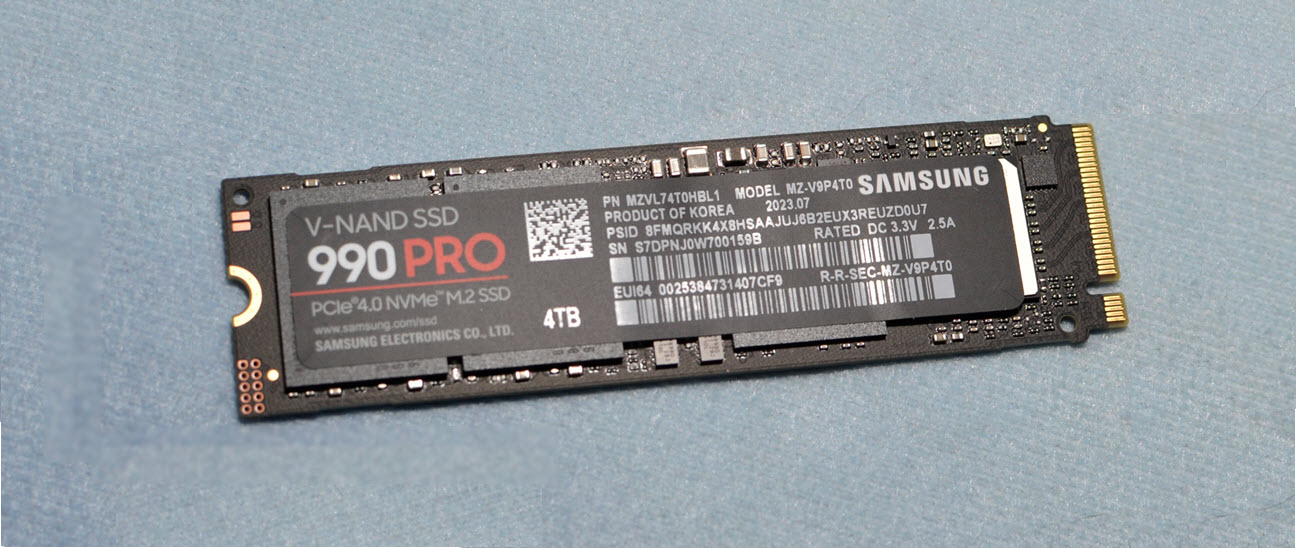Tom's Hardware Verdict
Samsung has taken the fight to WD by not only offering a 4TB model but also offering it in a single-sided form factor to make it a better fit for laptops and the PS5. It’s the fastest 4TB drive we’ve tested, reigning until that capacity becomes more common with PCIe 5.0 SSDs.
Pros
- +
Top tier performance in multiple tests
- +
Powerful, single-sided 4TB SSD with TLC
- +
Heatsink/RGB option
- +
Samsung software and support
Cons
- -
High MSRP
Why you can trust Tom's Hardware
We’re starting to see some great 4TB drives come to market, but what about Samsung? Well, the 4TB model promised at the 990 Pro’s launch is finally here. A sleek, high-performance SSD is at the top of every enthusiast’s list, and you no longer have to settle for 2TB per M.2 slot. Got a powerful laptop for on-the-go content creation? The 990 Pro will fit in that, too, with its cutting-edge single-sided design. Add in Samsung’s gold-standard software and support, and you can get 4TB of high-end performance in one nice package. Did we mention you can get it with a heatsink, too?
The 4TB 990 Pro comes on the heels of some exciting, capacious drives with YMTC flash from China. Potential controversy aside, these drives have made big waves with great performance and power efficiency. They’ve also proven to be inexpensive and, on top of that, single-sided even at 4TB while using superior TLC flash. Samsung answered this easily with a more powerful drive with DRAM that uses its newer V8 TLC, which, despite the layout restricting the drive to just two NAND packages, remains single-sided at 4TB. WD did not achieve this with its SN850X; for that matter, WD omitted its heatsink option at that capacity while Samsung maintained its own.
However, not all has been bright, as Samsung’s reputation was sullied earlier this year by problems with several of its SSDs, including the 990 Pro. These issues were largely later fixed with firmware updates, but not before Puget Systems stated it was switching to Sabrent. This makes it more important for Samsung to nail the 4TB 990 Pro as there are a lot of eyes on this space. We think, on the whole, Samsung did just that, although there are some performance nuances to go over. Given recent developments, this may not be the earth-shattering product many expected, but it’s now the best 4TB SSD on the market. Let's explore why.
Specifications
| Product | 1TB | 2TB | 4TB |
|---|---|---|---|
| Pricing | w/HS | $169.99 | $189.99 | $289.99 | $309.99 | $344.99 | $354.99 |
| Form Factor | M.2 2280 | M.2 2280 | M.2 2280 |
| Interface / Protocol | PCIe 4.0 x4 | PCIe 4.0 x4 | PCIe 4.0 x4 |
| Controller | Samsung Pascal | Samsung Pascal | Samsung Pascal |
| DRAM | LPDDR4 | LPDDR4 | LPDDR4 |
| Flash Memory | 176-Layer V-NAND TLC | 176-Layer V-NAND TLC | 236-Layer (V8) V-NAND TLC |
| Sequential Read | 7,450 MBps | 7,450 MBps | 7,450 MBps |
| Sequential Write | 6,900 MBps | 6,900 MBps | 6,900 MBps |
| Random Read | Up to 1.2M | Up to 1.4M | 1,600K |
| Random Write | Up to 1.55M | Up to 1.55M | 1,550K |
| Security | TCG/Opal 2.0 | TCG/Opal 2.0 | TCG/Opal 2.0 |
| Endurance (TBW) | 600TB | 1200TB | 2400TB |
| Part Number | w/HS | MZ-V9P1T0BW | MZ-V9P1T0CW | MZ-V9P2T0BW | MZ-V9P2T0CW | MZ-V9P4T0BW | MZ-V9P4T0CW |
| Height | w/HS | 2.30mm | 8.20mm | 2.30mm | 8.20mm | 2.30mm | 8.88mm (Single-Sided) |
| Warranty | 5-Year | 5-Year | 5-Year |
The new Samsung 990 Pro is available at 4TB and can reach up to 7,450 / 6,900 MB/s for sequential reads and writes. This is effectively at the limits of the PCIe 4.0 interface. It raises the bar on IOPS, reaching a staggering 1.6 / 1.55 million random read and write IOPS, respectively. Samsung backs this with a five-year warranty rated for 2400TB of endurance, which is more than enough. Launch pricing is $344.99 and $354.99 for the bare and heatsinked models, respectively. This drive carries a significant premium, but it’s worth $10 more for the heatsink, and further, we expect retail sale prices to be well below these values, as we've seen with other 990 Pro models.
Software and Accessories
Samsung supports the 990 Pro with its Samsung Data Migration software, which enables you to migrate your existing drive to the new Samsung drive and its gold standard Samsung Magician application. As of September of this year, this application is on version 8.0. This SSD toolbox contains several features, including drive and system information, diagnostics, performance testing and optimization, overprovisioning, LED/RGB control, encryption, and more. It even has a chatbot virtual assistant. It’s also a good way to keep your firmware up to date.
A Closer Look
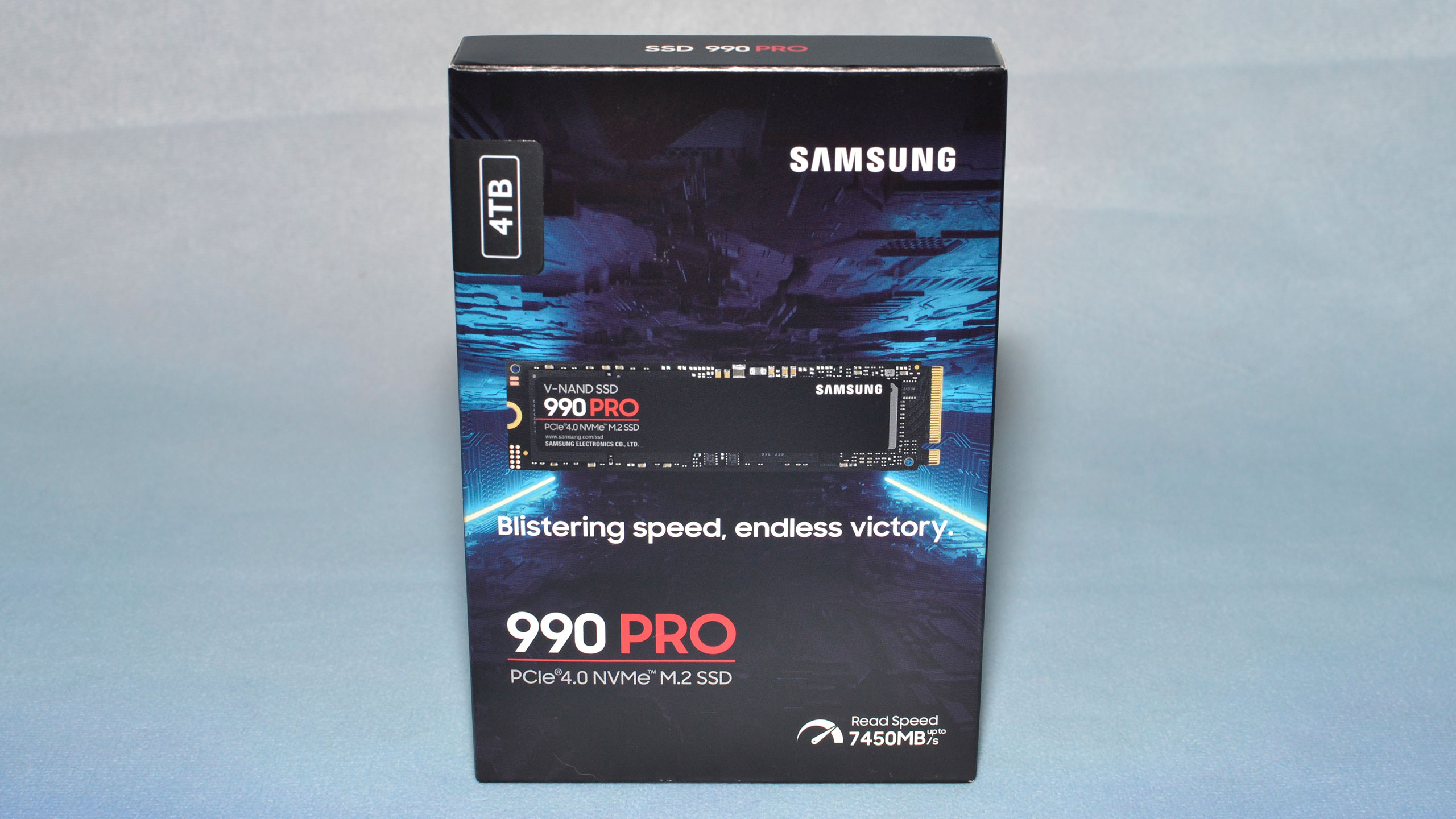
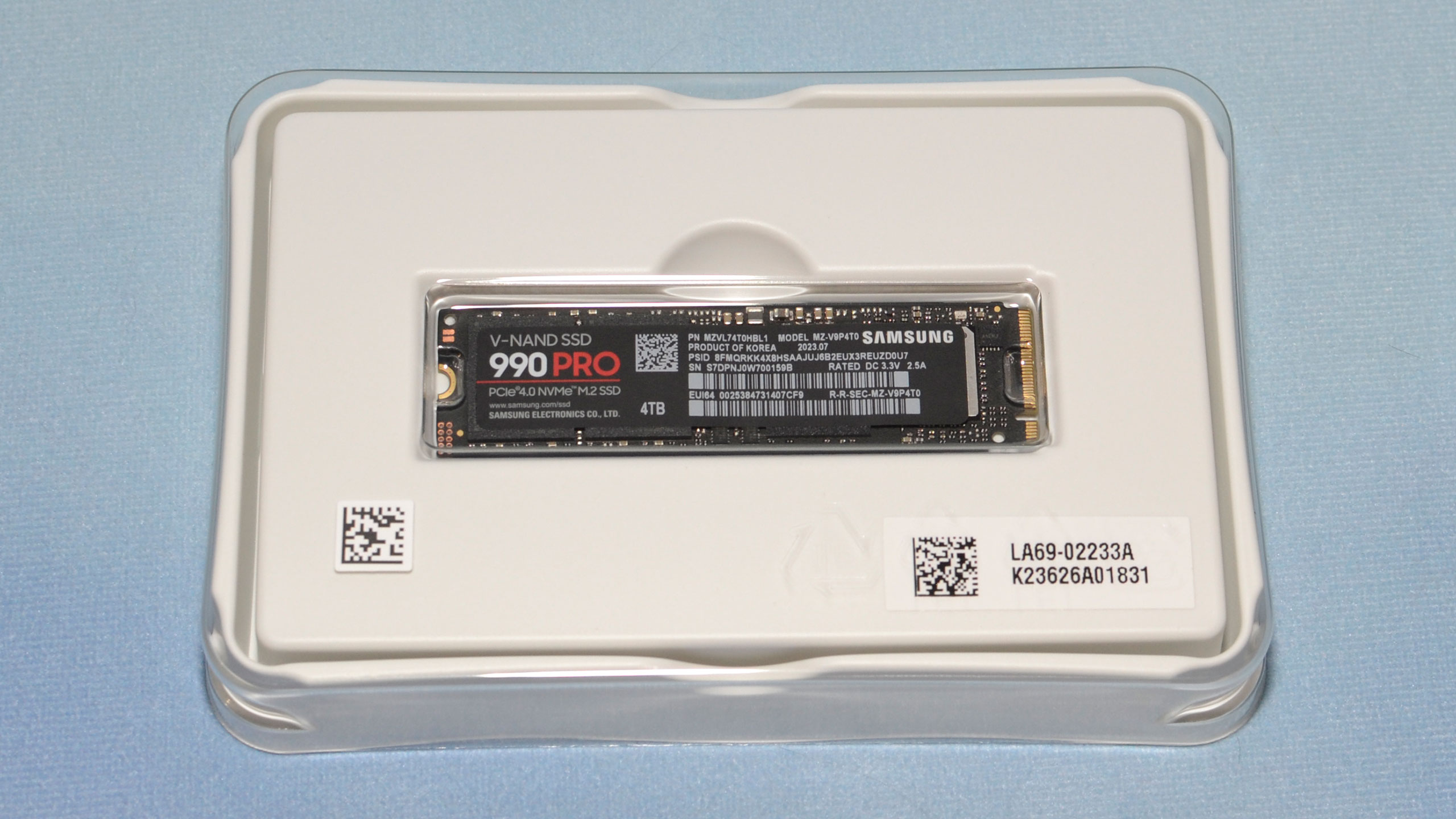
This is a standard Samsung drive, arriving in tight packaging without an abundance of fanfare. The 4TB 990 Pro does not look out of the ordinary, which is worth mentioning because counterfeit Samsung drives are rising. In fact, Samsung has a feature in its Magician software to detect counterfeit drives for this reason. If you peel back the label, which, despite common belief, generally does not void the drive’s warranty, you can determine if the drive is legitimate by checking out the hardware.
Specifically, look for the Pascal SSD controller, Samsung’s DRAM, and Samsung’s flash, although the latter two can sometimes appear on other drives. It’s also possible for counterfeiters to apply fake coding on components in addition to fake labels, but in both cases, there will be signs of tampering if you compare it to legitimate samples. Samsung is sticking with its single-sided, two-package design, which would be challenging to copy with 4TB of actual capacity, so there’s that, too.
Get Tom's Hardware's best news and in-depth reviews, straight to your inbox.
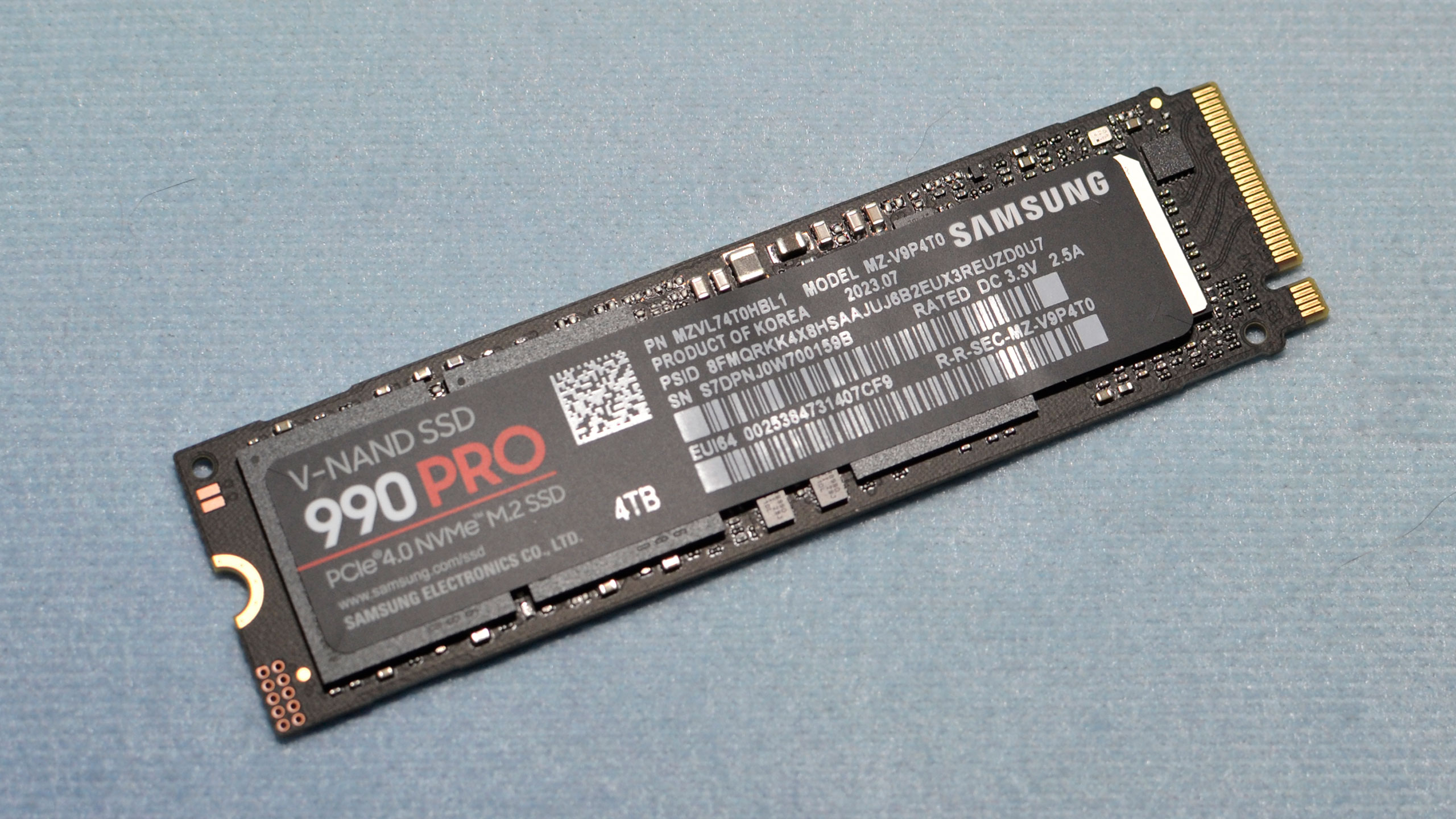
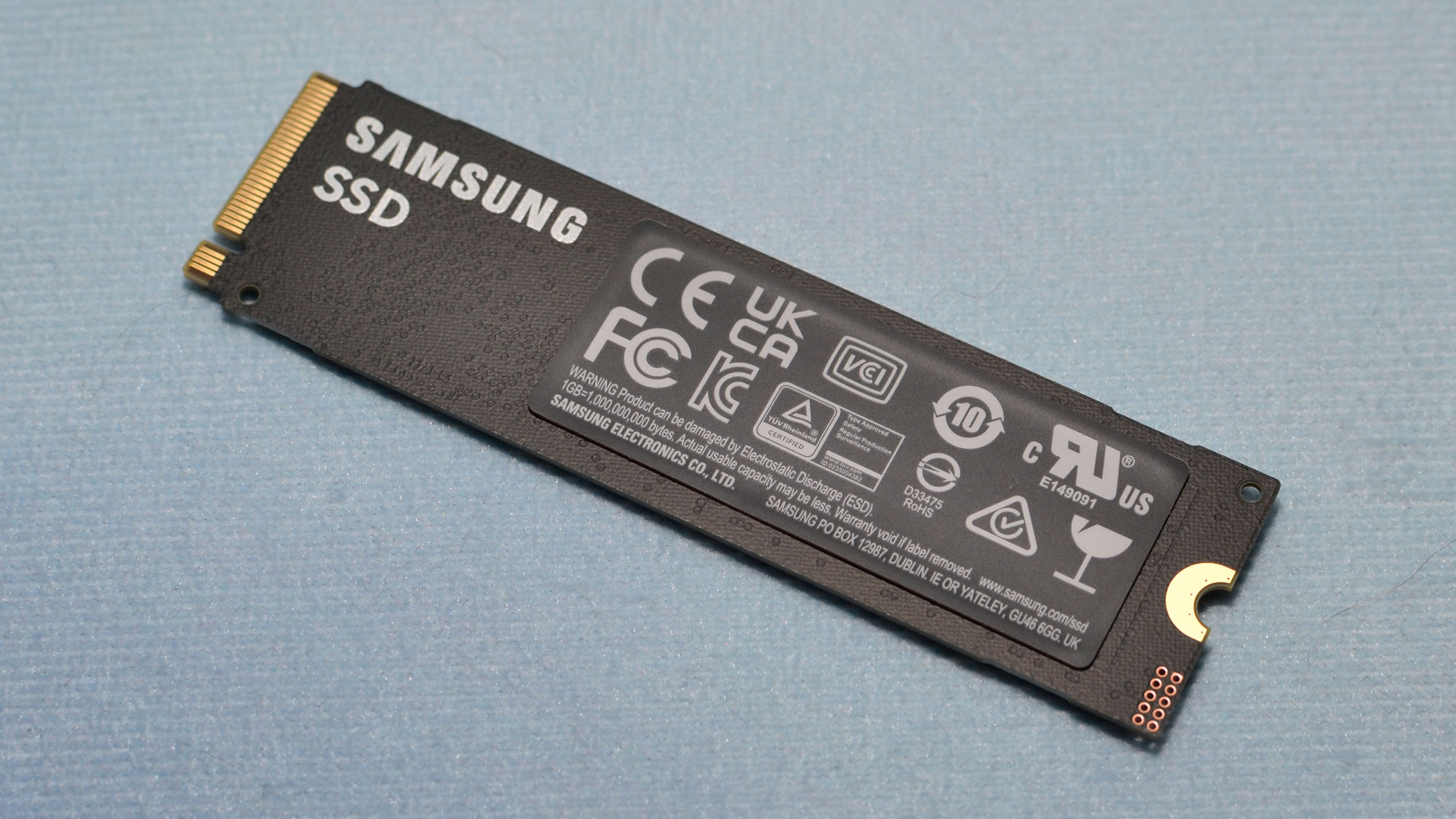
This single-sided design is quite nice for laptops and ultrabooks, some of which require a single-sided drive and small form factor builds. It’s nice for the PS5, too. It can be easier to cool a single-sided drive, and Samsung’s optional heatsink is a good investment for the console and your PC if you can fit it. Although we did not look at the heatsink today, it does have RGB LEDs like the earlier, smaller SKUs. One additional point worth mentioning is that Samsung can offer its heatsink at 4TB, unlike the 4TB WD Black SN850X, because the latter is double-sided. WD did overcome this limitation with the PS5-marketed SN850P, but that was an unpopular release.
MORE: Best Hard Drives
MORE: Best SSDs
MORE: How We Test HDDs And SSDs

Shane Downing is a Freelance Reviewer for Tom’s Hardware US, covering consumer storage hardware.
-
jaquith Reply
Nice review but the "Con" of high MSRP retail prices is a little misleading. The Samsung 990 Pro 1TB is listed on Newegg for $69.99, the 2TB is listed for $134.99 and the 4TB isn't in stock yet anywhere. I would imagine the 4TB costing somewhere less than twice the 2TB. The real world difference between Gen 4 and Gen 5 is negligible and the Gen 4 are considerably cooler to run. Until engineers resolve the higher temperatures problem, I think the Gen 4 is a much better deal.Admin said:Samsung 990 Pro 4TB Review: The Best Gets Bigger : Read more -
JarredWaltonGPU Reply
It's not a con of "High MSRP retail prices," it's a con of "High MSRP." Also, what you said implies "High manufacturer suggested retail price retail prices," which obviously makes no sense. As the article states:jaquith said:Nice review but the "Con" of high MSRP retail prices is a little misleading. The Samsung 990 Pro 1TB is listed on Newegg for $69.99, the 2TB is listed for $134.99 and the 4TB isn't in stock yet anywhere. I would imagine the 4TB costing somewhere less than twice the 2TB. The real world difference between Gen 4 and Gen 5 is negligible and the Gen 4 are considerably cooler to run. Until engineers resolve the higher temperatures problem, I think the Gen 4 is a much better deal.
"Launch pricing is $344.99 and $354.99 for the bare and heatsinked models, respectively. This drive carries a significant premium, but it’s worth $10 more for the heatsink, and further, we expect retail sale prices to be well below these values, as we've seen with other 990 Pro models." (Emphasis added.)
In short, we don't know yet where the 4TB model will eventually settle, but we do know that the stated launch price feels very high compared to what's already available. Samsung has had some great Black Friday SSD sales in the past, and I wouldn't be surprised to see sub-$300 pricing around BF this year. But we'll just have to wait and see how things develop over time with actual retail prices, rather than the official manufacturer suggested retail price. -
NuSHrike Following from the previous https://www.tomshardware.com/reviews/samsung-990-pro-ssd-review and this article, this latest 990 Pro is still not King for my needs.Reply
I need sustained writes and 990 Pros, and Samsungs in general, still fail at it. I'm talking in Windows, Explorer (where I rarely to never see 2GB/s write speeds), and other multimedia in general.
IOMeter sustained writes, 990 Pro 4TB collapses at 75s in while others like the Rocket 4 Plus-G 4TB keeps going until 120?s in, but then drops to a still higher steady state than the 990Pro 4TB. 990Pro is like a rabbit in a rabbit/turtle race -- early speeds, but no stamina.
Crystal Disk Mark:
* random writes, bottom of the pack
* random IOPS writes only middle of the pack vs Rocket 4 Plus-G, FireCuda, A440 Pro
* slowest write latency (though talking about microseconds)
* middle of the pack in peak sequential writes (QD1)
* finally but only #2 in peak sequential write (QD8)
I think about these things when I'm making multi-GB copy of Unity files from one place to another.
Peak reads don't really matter as they're all the same on average in real-world usage where usual numbers never reach above 1GB/s, and well within the performance of all PCIe4 SSDs. -
JarredWaltonGPU Reply
Having used the Sabrent Rocket Plus-G 4TB for almost a year now... I'm ready to ditch it. Something has gotten screwy. The drive is only ~50% full, and read speeds have completely collapsed. I'm talking less than 100 MB/s! It's terrible.NuSHrike said:Following from the previous https://www.tomshardware.com/reviews/samsung-990-pro-ssd-review and this article, this latest 990 Pro is still not King for my needs.
I need sustained writes and 990 Pros still fail at it. I'm talking in Windows, Explorer (where I rarely to never see 2GB/s write speeds), and other multimedia in general.
IOMeter sustained writes, 990 Pro 4TB collapses at 75s in while others like the Rocket 4 Plus-G 4TB keeps going until 120?s in, but then drops to a still higher steady state than the 990Pro 4TB. 990Pro is like a rabbit in a rabbit/turtle race -- early speeds, but no stamina.
Crystal Disk Mark:
* random writes, bottom of the pack
* random IOPS writes only middle of the pack vs Rocket 4 Plus-G, FireCuda, A440 Pro
* slowest write latency (though talking about microseconds)
* middle of the pack in peak sequential writes (QD1)
* finally but only #2 in peak sequential write (QD8)
I think about these things when I'm making multi-GB copy of Unity files from one place to another.
Peak reads don't really matter as they're all the same on average in real-world usage where usual numbers never reach above 1GB/s, and well within the performance of all PCIe4 SSDs.
I can temporarily get things better by making a copy of a folder (like Borderlands 3). But after a few weeks or so (not sure on the time), read speeds on those files become crap again. I'm going to try imaging the 4TB drive to a different 4TB SSD to see if that fixes things, and run that way for a while.
I don't know for sure what the problem is, so maybe it's Sabrent, maybe something else in my test PC, maybe Windows... so many possibilities! Anyway, I'm just saying that it's tough to know — really know — if any SSD will be great long-term. Also super frustrating. Like, stuff that only happens after several months would never show up in a review. Sigh.
As for the 990 Pro 4TB, we're also testing hardware BitLocker encryption. If you have Windows 11 Pro and a drive with OPAL support, it will still default to software. You have to jump through a bunch of hoops. Probably a lot of people are running Windows 11 Pro with software encryption and they don't even realize it! -
NuSHrike Reply
Only a year means it falls under warranty? Thanks for the heads-up on longevity.JarredWaltonGPU said:Having used the Sabrent Rocket Plus-G 4TB for almost a year now... I'm ready to ditch it. Something has gotten screwy. The drive is only ~50% full, and read speeds have completely collapsed. I'm talking less than 100 MB/s! It's terrible.
I can temporarily get things better by making a copy of a folder (like Borderlands 3). But after a few weeks or so (not sure on the time), read speeds on those files become crap again. I'm going to try imaging the 4TB drive to a different 4TB SSD to see if that fixes things, and run that way for a while.
As for the 990 Pro 4TB, we're also testing hardware BitLocker encryption. If you have Windows 11 Pro and a drive with OPAL support, it will still default to software. You have to jump through a bunch of hoops. Probably a lot of people are running Windows 11 Pro with software encryption and they don't even realize it! -
JarredWaltonGPU Reply
Not a question of warranty. I was sent the sample for use in our GPU test PC. Thankfully, I have some alternatives available. If I image to the Lexar NM790 and the problem goes away (and stays gone!), that will be sufficient for my purposes. If it sticks around, then it's a problem with my PC somewhere (or Windows) and I get the fun job of cleaning out all the files and re-imaging the drive. Right now, I just have a bit of a sour taste now thanks to what happened with the Sabrent Plus-G 4TB. Probably need to ping them and see if they have any thoughts on what's going on.NuSHrike said:Only a year means it falls under warranty? Thanks for the heads-up on longevity. -
Greg7579 Reply
Jarred, I want 8TB M.2 PCIe Gen 4 for my single main data drive. There are 2 or 3 of those at 900 bucks but I want more of them competing out there. Why is 4TB the common ceiling? I want to fit all my image files on one drive. No array. Then I can back up the M.3 PCIe 4 drive to single Samsung SATA QVO 8TB drives that have dropped from 900 to 300 bucks in the last 2 years.JarredWaltonGPU said:It's not a con of "High MSRP retail prices," it's a con of "High MSRP." Also, what you said implies "High manufacturer suggested retail price retail prices," which obviously makes no sense. As the article states:
"Launch pricing is $344.99 and $354.99 for the bare and heatsinked models, respectively. This drive carries a significant premium, but it’s worth $10 more for the heatsink, and further, we expect retail sale prices to be well below these values, as we've seen with other 990 Pro models." (Emphasis added.)
In short, we don't know yet where the 4TB model will eventually settle, but we do know that the stated launch price feels very high compared to what's already available. Samsung has had some great Black Friday SSD sales in the past, and I wouldn't be surprised to see sub-$300 pricing around BF this year. But we'll just have to wait and see how things develop over time with actual retail prices, rather than the official manufacturer suggested retail price. -
JarredWaltonGPU Reply
It was previously a question of NAND density. To get to 8TB basically required QLC NAND and four NAND packages. Alternatively, 4TB TLC with four NAND packages was possible. I'm not sure of the absolute maximum, but that's basically where we ended. (If you can only do 4TB with TLC, then QLC would only get you 5.3TB with QLC... or alternatively, 8TB with QLC means you should be able to do 6TB with TLC.)Greg7579 said:Jarred, I want 8TB M.2 PCIe Gen 4 for my single main data drive. There are 2 or 3 of those at 900 bucks but I want more of them competing out there. Why is 4TB the common ceiling? I want to fit all my image files on one drive. No array. Then I can back up the M.3 PCIe 4 drive to single Samsung SATA QVO 8TB drives that have dropped from 900 to 300 bucks in the last 2 years.
The good news is that Samsung's latest NAND, used here on the 4TB 990 Pro, should allow a dual-sided configuration to hit 8TB while still being TLC. Whether that will happen any time soon is a different question. But other drives are also 4TB and single-sided, and now there are 8TB dual-sided (still not sure on TLC or QLC, though — I'd have to double check... and I did, and there are TLC 8TB now thanks to BiCS5, possibly some other NAND types as well).
I think in general the feeling among SSD manufacturers is that 8TB for a consumer drive is still very niche, and so it's not being pursued. Probably going to take a few years for 8TB to come down to reasonable pricing levels. Cheapest for now is the Teamgroup MP44 at $800. Probably in two years (maybe less) we'll see that below $400, and fast 4TB drives below $200. -
USAFRet Reply
I didn't know until Macrium informed me.JarredWaltonGPU said:Probably a lot of people are running Windows 11 Pro with software encryption and they don't even realize it!
MS Surfaec 3 Go came with Windows S.
Promote that to WIn 11 Home, and the BitLocker remains.
I didn't know it was BL until the first time I did a full drive Image in Macrium.
"This Image is of a BitLocker encrypted Volume, but this Image is unencrypted." (or words to that effect)
wait, WHAT? -
farhadd Jarred, do you think we'll ever see Tom's Hardware reviewing Fanxiang drives? I know they might not be top end hardware but their price and performance promises are extremely tempting for a gaming storage drive etc.Reply
